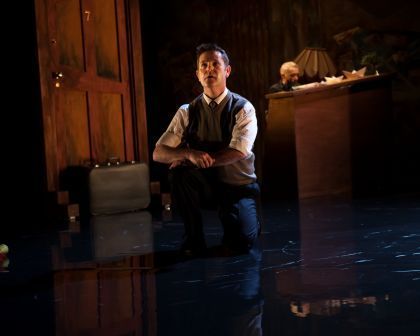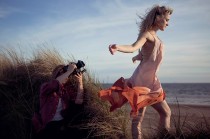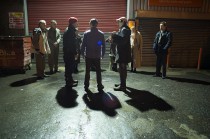Plan B originally presented a A Wee Home From Home over twenty years ago: a provocative glance at Glasgow’s reputation as “no mean city”, it bravely took on tartan clichés and shortbread sentimentality, nailing the nostalgia industry and putting Frank McConnell’s background in Highland dance to unexpectedly relevant ends. When Scotland announced 2009 as The Homecoming Year – little more than an excuse to sell a brand on an international stage, Plan B’s revival was a sharp corrective to the question, as McConnell puts it, whether “are we as a nation defined by ancestry, the enlightenment, Burns, whisky and golf?”
When Wee Home first appeared, it brought together three artists who could rightly be regarded as national treasures. Apart from McConnell, director Gerry Mulgrew has a reputation as one of Scotland’s most forward thinking performers. Through his own company Communicado, he continues to develop an imaginative and politically astute theatre, most recently in his version of The Government Inspector. Making up the trinity, is singer songwriter Michael Marra, who has justly been called a Scottish Tom Waits.
While both subject matter and creators are undeniably Scottish, McConnell says that he likes “to think of the piece as equally part of a European dance theatre tradition.” Certainly, he mentions influences from across the continent, alongside Scottish names. “Maybe I didn’t realise it at the time but Royston Maldoom has always been an influential figure. And in the past year I was devastated by the death of Pina Bausch,” he admits. This acknowledge of both European and local inspiration is, however, distinctive of the Scottish artists of the past twenty years. Amongst other opportunities, the year as City of Culture in 1990, and the programming of Tramway, has encouraged Caledonian performers to look to the east.
Wee Home tells the story, through song and dance, of a man returning to Glasgow after a period away, and reflects on the myths and shared stories that make up the city. Gerry Mulgrew remembers that these stories connected him and McConnell more than he had expected. “When we first devised the piece together in the eighties, Frank and I realised we had both been brought up in Partick within yards of each other and it was the memory of those city streets, of the bustle of Dumbarton Road, which formed the genesis of the story.” Perhaps this joint history makes Wee Home so deft in its analysis of Glasgow, although the arrival of Marra seemed to be a slight distraction.
“Mick being a Dundonian,” Mulgrew laughs. “We had to teach him certain Glasgow moves to make him an honorary Weegie: but the boy learns fast!” Indeed, so fast did Marra pick them up, his song Mother Glasgow has become something of an alternative anthem for the city. Yet despite its West Coast flavor, Mulgrew insists that the work is not parochial.
“In essence it is a universal, timeless piece about returning to the place of your childhood, a subject for art which crosses all boundaries.” As for the gap between the original production and its revival, Mulgrew is unconcerned. “Twenty-one years is a quite miniscule period of time in terms of human history.” More specifically, in the year of Homecoming, it is perhaps a necessary antidote to some of the more gruesome heritage aspects of Scotland The Brand.”
Mulgrew’s attitude is, in itself, expressive of that great Glaswegian virtue: gallusness, or an almost reckless swagger that translates into a fearless self-confidence. While Wee Home may have more than a few distinctive Glaswegian episodes - the memories of school and the particular religious upbringing are uniquely West Coast – it resonates with a universal energy that is recognisable to any traveller returning back to an unwelcoming homecoming.















Comments